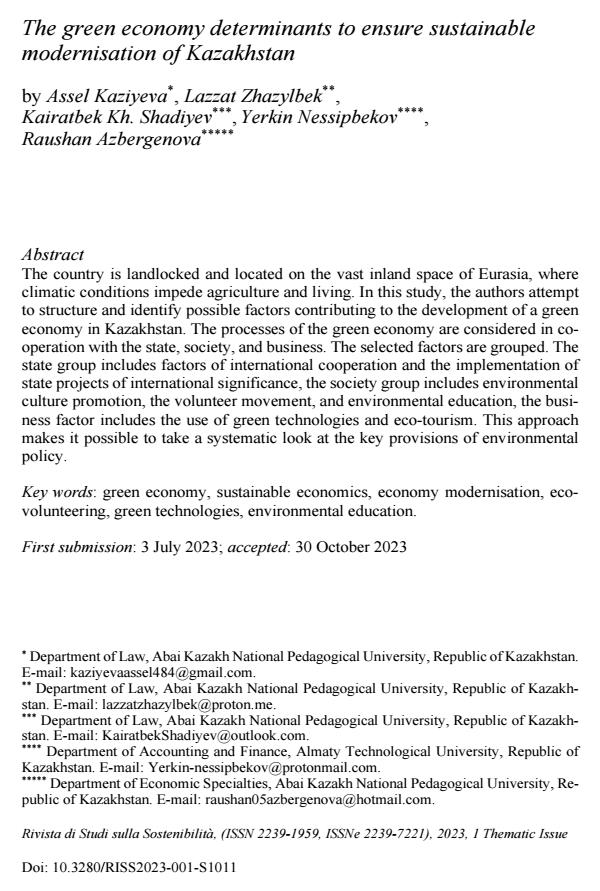The green economy determinants to ensure sustainable modernisation of Kazakhstan
Titolo Rivista RIVISTA DI STUDI SULLA SOSTENIBILITA'
Autori/Curatori Assel Kaziyeva, Lazzat Zhazylbek, Kairatbek Kh. Shadiyev, Yerkin Nessipbekov, Raushan Azbergenova
Anno di pubblicazione 2023 Fascicolo 2023/1 T.
Lingua Inglese Numero pagine 16 P. 167-182 Dimensione file 120 KB
DOI 10.3280/RISS2023-001-S1011
Il DOI è il codice a barre della proprietà intellettuale: per saperne di più
clicca qui
Qui sotto puoi vedere in anteprima la prima pagina di questo articolo.
Se questo articolo ti interessa, lo puoi acquistare (e scaricare in formato pdf) seguendo le facili indicazioni per acquistare il download credit. Acquista Download Credits per scaricare questo Articolo in formato PDF

FrancoAngeli è membro della Publishers International Linking Association, Inc (PILA), associazione indipendente e non profit per facilitare (attraverso i servizi tecnologici implementati da CrossRef.org) l’accesso degli studiosi ai contenuti digitali nelle pubblicazioni professionali e scientifiche.
The country is landlocked and located on the vast inland space of Eurasia, where climatic conditions impede agriculture and living. In this study, the authors attempt to structure and identify possible factors contributing to the development of a green economy in Kazakhstan. The processes of the green economy are considered in cooperation with the state, society, and business. The selected factors are grouped. The state group includes factors of international cooperation and the implementation of state projects of international significance, the society group includes environmental culture promotion, the volunteer movement, and environmental education, the busi- ness factor includes the use of green technologies and eco-tourism. This approach makes it possible to take a systematic look at the key provisions of environmental policy.
Parole chiave:green economy, sustainable economics, economy modernisation, eco- volunteering, green technologies, environmental education.
Assel Kaziyeva, Lazzat Zhazylbek, Kairatbek Kh. Shadiyev, Yerkin Nessipbekov, Raushan Azbergenova, The green economy determinants to ensure sustainable modernisation of Kazakhstan in "RIVISTA DI STUDI SULLA SOSTENIBILITA'" 1 T./2023, pp 167-182, DOI: 10.3280/RISS2023-001-S1011